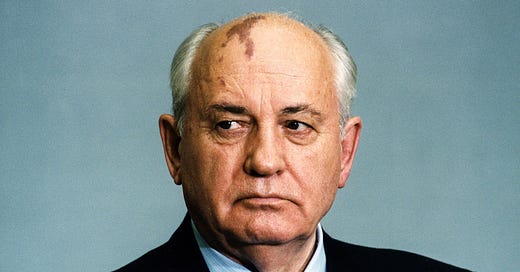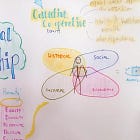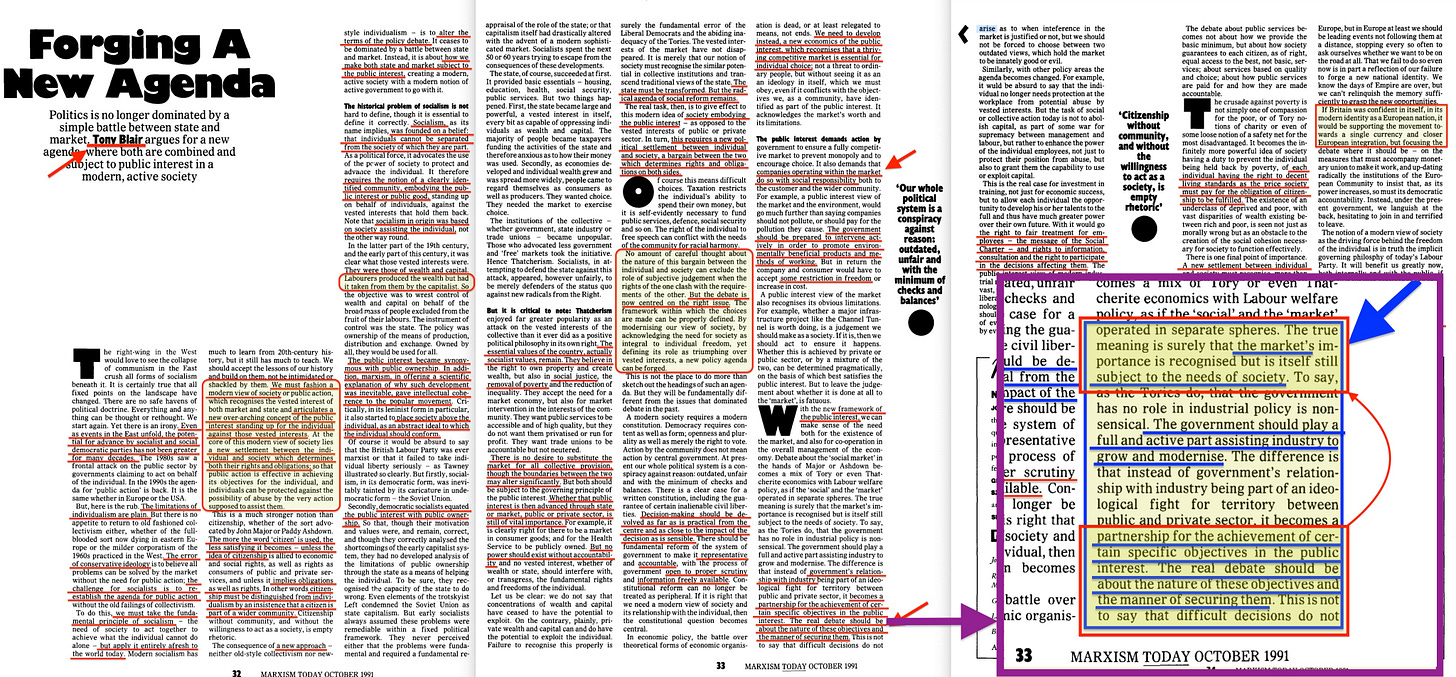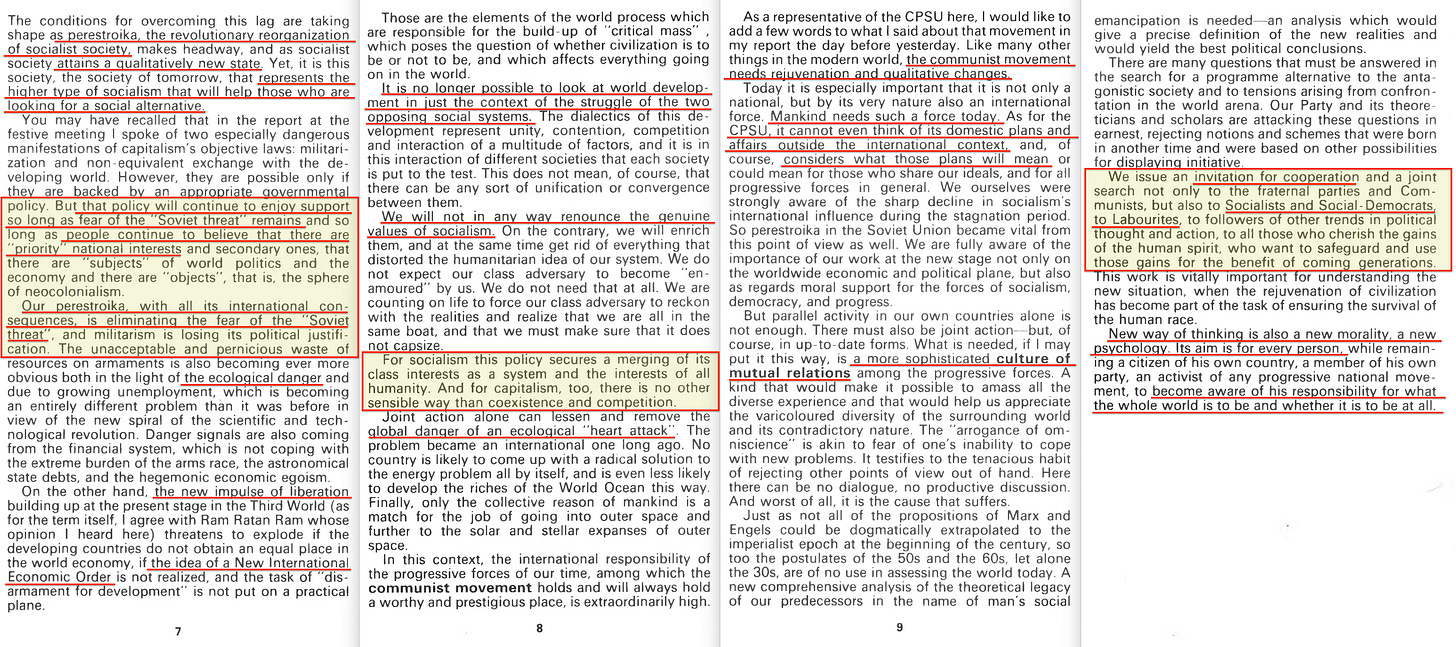The recent post on Lenin’s New Economic Policy left a crucial question open.
Is ‘The Perestroika Deception‘ credible?
In short - the New Economic Policy allowed private enterprise (in a limited capacity) to cooperate with the public for the achievement of the ‘common good’. The trick lies in defining what is considered in the public interest - and Lenin assigned this role exclusively to the Communist Party.
This same model was, incidentally, also proposed by Tony Blair in his 1991 article in the now-defunct journal, Marxism Today, which appears appropriate in this context. However, it wasn’t until 1998 that he revealed who should define the ‘common good’. And his answer - the Civil Society Organisations.
And in precisely 1998, the United Nations granted General Consultative Status (GCS) NGOs access to all parts of the United Nations. Around the same time, Wolfgang Reinicke’s ‘Trisectoral Network’ proposed a similar approach - a Public-Private Partnership for the ‘common good’, with the definition of the latter dictated by Civil Society Organisations, ie GCS NGOs.
I summarised this model, which can broadly be considered a version of Corporatism. However, it represents a broader principle - the fusion of a third party mediator into a democratic process, a mechanism that - which perhaps appearing ironic - seeks to extinguish the very principles of democracy itself.
While corporatism itself emerged in the wake of the French Revolution, a more contemporary variant is particularly noteworthy. And this would be the version integrated into the League of Nations, ultimately crafted by a member of the Fabian Society - of which Tony Blair (mentioned above) is a member.
So you see - these are not baseless accusations, or poorly sourced theories. Practically every part of the information trail has been meticulously documented, such as this post on Keir Starmer’s Fabian Society. And these posts are as detailed as they as they seek to build an absolutely watertight case.
But let’s get on with the show. The first document to visit today is ‘Realities and guarantees for a secure world’1, penned by none other but Mikhail Gorbachev himself. And it’s not really terribly interesting to begin with.
‘Objective processes are making our complex and diverse world more and more interrelated and interdependent. And it increasingly needs a mechanism capable of discussing common problems in a responsible fashion and at a representative level. This mechanism needs to be a place of mutual search for a balance of differing, contradictory, yet real, interests of the contemporary community of states and nations.‘
It’s interdependent (collectivist), it calls for a mechanism enabling debate, and this should of course be balanced. A mediating mechanism, in other words. And the objective is -
‘… comprehensive system of international security…‘
Communists, however, have very different definitions than capitalists when it comes to terms like peace, human rights, and security2.
And Gorbachev continues, in similar vein to contemporary climate alarmists -
‘At the same time dangers have emerged which put into question the very immortality of the human race. This is why new rules of coexistence on our unique planet are badly needed, rules which conform to the new requirements and the changed conditions. Alas, many influential forces continue adhering to outdated notions concerning wavs for ensuring national security’
In brief, he calls for new arrangements for national security to address these ‘changed conditions’. It’s run-of-the-mill rhetoric, continuing with the usual claims of impending nuclear armageddon should we fail to act.
To ensure everyone is dragged into the conflict of the Two Tribes3 -
‘The division of the world's countries into those possessing nuclear weapons and those not possessing them has split also the very concept of security. But for human life security is indivisible. In this sense it is not only a political, military, and juridical category, but also a moral one.‘
The argument shifts to one of alleged morality, because framing it as an ethical imperative makes it far more persuasive.
‘… a mechanism could be set up under the aegis of the United Nations Organization for extensive international verification of compliance with agreements on lessening international tension and limiting armaments, and of the military situation in conflict areas. The mechanism would use various forms and methods of monitoring to collect information and promptly submit to the United Nations.‘
And should you agree to this, you’ve just agreed to comprehensive global surveillance. The stated purpose is merely secondary.
‘The ideas and initiatives concerning the setting up of non-governmental commissions and groups which would analyze the causes, circumstances and methods of resolving various concrete conflict situations appear to be fruitful.‘
And there’s the call for third parties to ‘mediate’ - including NGOs, of course. But the issue extends beyond nuclear security to comprise -
‘The events and tendencies of the past decades have expanded this concept, imparting new and specific features to it. One of them is the problem of economic security.‘
They always do this. Always. Gorbachev uses claims of nuclear armageddon as a pretext to introduce additional initiatives, which in this case relate to not only the economic debt burden of 3rd world nations, but also (and I will quote in full so that I can properly explain what they most subversively do) -
‘If the debt burden of the developing world is alleviated, the chances for such a future will grow. It is also possible to limit debt payments by each developing country to the share of its annual export earnings without detriment to development; to accept export commodities in payment for the debt; to remove protectionist barriers on the borders of creditor-nations; and to stop adding extra interest when payments on debts are deferred.‘
The long-term objective here is clear: the gradual elimination of the nation state. As we’ve discussed, the Fabian Society found neoliberal policies useful for this purpose, as free trade policies, in essence, compel cross-boundary legislation to harmonise, thus slowly eroding national sovereignty.
What will eventually happen is that creditor nations will object to unfair trade policies - or have the IMF do it for them, as debts skyrocket regardless, prompting bailouts (which are granted on neoliberal terms, such as free trade).
Anyway, Gorbachev isn’t quite finished expanding on the initial premise -
‘The words "through concerted effort" are very important for today's world. The interconnection between disarmament and development,‘
This ties into the socialist ideal of demilitarization, where all proceeds are hypothetically redirected ‘for good’, whatever that might be. One such ‘good’ is -
‘Ecological security. It is dangerous in the direct meaning of the word when currents of poison flow along river channels, when poisonous rains pour down from the sky, when an atmosphere polluted with industrial and transport waste chokes cities and whole regions, when the development of atomic engineering involves unacceptable risks.‘
Et voila. Gorbachev has now pivoted to environmentalism, where ‘industrial and transport waste‘ essentially refers to carbon dioxide.
‘For us, Chernobyl became such a thorn... The relationship between man and the environment has become menacing. Problems of ecological security affect all- the rich and the poor alike. What is required is a global strategy for nature conservation and the rational use of resources.’
Smooth, Gorbachev. This is now about the administration of the global commons. Incidentally, did you know that ‘in 1956, IUCN changed its name to International Union for Conservation of Nature and Natural Resources‘4? Even today it’s described as ‘… an international organization working in the field of nature conservation and sustainable use of natural resources‘5.
And to this end -
’We suggest starting its elaboration within the framework of the UN special programme. States are already exchanging relevant information and notifying international organizations of the state of affairs. We believe that this practice should be turned into a law…‘
The UN should serve as a global database for the contextual exchange of information, with the distribution of said information becoming a legal requirement. Gorbachev then transitions to a section on ‘human rights’ which - again - collectivists interpret through a very different lens -
You have a responsibility to uphold the collective rights of others.
‘First of all, it is necessary that national legislation and administrative rules in the humanitarian sphere be brought into accordance with international obligations and standards everywhere.‘
There are few areas where communist nations could push for global harmonization of legislation. But - allegedly - standing up for essential human rights is one, primarily because the MSM will paint you as a villain should you disagree. And never mind that said collectivist states rarely uphold such rights themselves.
Of course, this objective could be a long-term one, thus the first step would be the brainwashing of the youth through UNESCO -
‘It is advisable that all states join the UNESCO conventions in the sphere of culture, including the conventions on the protection of the world cultural heritage and on the prohibition and prevention of the illicit import, export and transfer of ownership of cultural property.‘
Because by agreeing to this, states implicitly agree to6 -
‘Nations that become members of UNESCO accordingly assume an obligation to revise textbooks used in their schools‘
And Gorbachev just keeps moving the goalposts -
‘It will be necessary resolutely to enhance the authority and role of the UN and the International Atomic Energy Agency. There is a strong need for a world space organization… ‘
The IAEA, of course, oversees nuclear energy production. Now, imagine drowning nuclear plants in endless red tape and absurd demands…
‘… the possibilities of the International Court Justice either. The General Assembly and the Security Council could approach it more often for consultative conclusions on controversial international legal issues. Its mandatory jurisdiction should be recognized by all…‘
… and Gorbachev is advocating for the ICC to wield not only immense power over legal rulings but also significant influence in drafting international agreements.
‘We are convinced that a comprehensive system of security is at the same time a system of universal law and order which ensures the primacy of international law in politics.‘
Ie, Gorbachev wants to facilitate a colossal transfer of power to the ICC.
‘We are convinced that cooperation between the UN and regional organizations could be considerably expanded. The aim is to search for a political settlement to crisis situations.‘
Ah, so a mediator, perchance?
‘We emphatically stress the need for making the status of important political documents passed at the United Nations by consensus more binding morally and politically.‘
Setting aside what constitutes ‘important’, for this ‘moral call’ to have effect, it must be communicated… perhaps through education and thus UNESCO?
‘In our opinion, we should have long ago set up a world consultative council under the UN auspices to bring together the world's intellectual elite. Prominent scientists, political and public figures, representatives of international public organizations, cultural workers, people in literature and the arts, including winners of the Nobel Prize and other international prizes of world-wide significance, and eminent representatives of the churches could greatly enrich the spiritual and ethical potential of contemporary world politics.‘
All those ‘stakeholders’ would be ‘consulted’, consolidating decision-making into a single office ripe for corruption - under the guise of ethical imperatives. And while the statement does not explicitly name civil society organizations or NGOs, their inclusion can be easily accommodated under the banner of ‘representatives of international public organizations’ or ’individual intellectual elites‘.
And I commonly see these… hints of arrogance in these documents -
‘The political and moral core of the problem is the trust of states and peoples in one another, respect for international agreements and institutions.’
Because - as per usual - the phrasing is so obviously Aesopian -
’And we are prepared to switch from confidence measures in individual spheres to a large-scale policy of trust which would gradually shape a system of comprehensive security. But such a policy should be based on oneness of political statements and real stands.‘
Through a common set of standards for everyone, aligned structures, enforced compliance, and collective decision-making, this ultimately leads to Global Governance. And - beyond nuclear armageddon, and alleged ‘human rights’ - this is set in context of -
‘What is required is a global strategy for nature conservation and the rational use of resources.’
The IUCN in 1991 published a comprehensive review of the USSR7, revealing a striking historical alignment with conservation efforts in general. And notably, it references the All Russian Society for Nature Protection (VOOP) which will be explored further below. But first, let’s address Gorbachev himself.
In 1988, Gorbachev released the booklet ‘Using the Potential of Cooperatives for Furthering Perestroika‘8. Cooperatives, in the Leninist sense, were elaborated upon in the previous post on the New Economic Policy, but in short - along with the NEP itself - these cooperatives were essentially structured to ensure that the Communist Party retained the ultimate power to terminate their charter. Oh wait, that sounds remarkably similar to the expression used by Blair in 1991, but the intent remains the same.
‘… to draw every citizen of the country into the running of society's affairs. This is the aim of the Party's policy and its organizational activities, of all the legislative acts of perestroika.‘
The aim of Perestroika is… to draw every citizen into the running of society’s affairs? Oh, you mean through a Civil Society Organisation?
‘Comrades, the present generation of the Soviet people are faced with extremely important and very complex tasks. And the better we grasp their essence and the greater the scope of perestroika becomes, the more necessary it becomes to have a deep understanding of the experience of all generations of builders of socialism.‘
Gorbachev here tells you to revisit the work of his predecessors.
‘We must analyze it not for the sake of repeating truths known to everybody, but in order to master the Marxist-Leninist methods and dialectics of revolutionary renovation, to apply them in a creative way for tackling the tasks of the day.‘
With a specific eye on mastering Marxist-Leninist methods to creatively apply these challenges. Oh wait, didn’t Blair say something similar in his Third Way -
‘The Third Way is a serious reappraisal of social democracy, reaching deep into the values of the Left to develop radically new approaches‘
But Gorbachev next makes it all too obvious -
‘This makes it more incumbent to re-read Lenin as if we were reading him for the first time, to fathom his views on the ways of building a new society. This is precisely what we are doing as we return to one of the most brilliant discoveries of Lenin's—his teaching on socialist cooperatives.‘
‘In his famous article "On Cooperation" Lenin convincingly showed that when state power is in the hands of the working people, when the socialist state is the owner of the land and the basic means of production, and when it directs the work of cooperatives. the growth of cooperatives in these conditions is identical with the growth of socialism.‘
It’s a Public (state power) Private (cooperatives) Partnership. It’s Lenin’s New Economic Policy in drag.
‘This is why Lenin so insistently called for close contacts between state-run and cooperative enterprises, for their joint participation in solving production and social problems…‘
And these should cooperate for the common good.
‘… he called for the fullest possible participation, on a strictly voluntary basis, of the working population of the country in cooperatives.‘
The latter is a Civil Society Organisation: voluntary, selectively involved, and participating… when it doesn’t interfere with the overall objective.
It’s ‘International Governance’, the ‘New Economic Policy’, the IFDA ‘Third System’, Deng’s Xiaoping reformed system, Blair’s ‘Third Way’, Reinicke’s ‘Trisectoral Network’. It’s the same structure, repeating continuously, where the trick lies in controlling the third party, which defines the ‘common good’. But for those on the fence, Gorbachev even explicitly drags in Lenin’s New Economic Policy further down the page.
But this tripartite mechanism, while clearly finding broad - if manipulative - use, can be generalized and summarized quite simply -
Insert mediator.
Control mediator.
In 1989, Gorbachev also penned ‘The Socialist Idea and Revolutionary Perestroika’9, which is less overt in its first chapter, titled ‘Where are we going? The Essence and Goals of Perestroika‘ -
‘… a radical overhaul of the entire social edifice, from its economic foundation to the superstructure, is essential. And we are not dealing with mere words, but taking practical steps to change property relations, economic structures, the political system and the spiritual and moral climate in society… The Party has initiated a nationwide discussion of our past, caused us to rethink our concept of socialism, …‘
This somewhat aligns with Blair’s rhetoric above, but -
‘We are using the Leninist method, and this means that we must analyze how the future is derived from reality… Today we are taking radical steps to reorganize society…‘
Predicting the future, in this context, suggests planning through a systems approach, which in short means Bogdanov’s Tektology.
‘One can only speak about the existence of two major points of view. One is that the administrative-command system and rigid planning and control should be preserved not only in the economy but also in culture.’
In other words, top-down authoritarianism, with a side of Proletkult (also Bogdanov).
’The other is based on the assumption that our recent history has confirmed that the choice we made in October 1917 was wrong and that we must change our society to a capitalist one. Can we follow either of these courses? No, we reject them both, …‘
… and it’s neither socialist nor capitalist. It’s a… Third Way.
‘We regard perestroika as a lengthy stage in the historical development of socialism, during which we shall replace the authoritarian bureaucratic system with a truly democratic and self-governing society.‘
And this will be a very gradual rollout. Very.
‘… and social forms and institutions and ideological trends compete, society acquires a new quality and socialism acquires a new face. The renewal of developing socialism is a process that will take decades and will continue well into the twenty-first century.‘
In fact, the plan was for it to continue… until and likely beyond today.
Mikhail Gorbachev, of course, is credited with co-founding the Green Cross International10 -
‘… in October 1987, five years before the first Earth Summit in Rio de Janeiro, Mikhail Gorbachev addressed a gathering in the Arctic city of Murmansk, and for the first time linked the concepts of environmental protection, nuclear disarmament, broader security concerns and development.‘
And that would be the above document. And - per Gorbachev - ‘The mission of the Green Cross is threefold‘
‘We must awaken humanity to take action on the Environmental Planetary Crisis‘
That sounds awfully similar to the Earth Charter.
‘We must change from within - our inner values and consciousness’
A Global Ethic, perchance?
‘We must work together with all sectors of society and over international board‘
Right, so a Trisectoral Network, a Third Way, a Third System, a New Economic Policy, an International Government Mediator Approach?
The Green Cross itself is… interesting. Its Russian version was founded in 1994 by the VOOP11, the ‘All Russian Society for Nature Protection‘12. And they in 1960 joined the International Union for the Conservation of Nature. This timing aligns perfectly with the emergence of the ‘new plan’ under Khrushchev, as outlined in ‘The Perestroika Deception’.
The VOOP deserves more attention. But let’s leave that for later, and instead nail the coffin. So here’s ‘To Feel Responsible for the World's Destiny: Speeches Made at the Meeting of Representatives of the Parties and Movements Participating in the Celebration of the 70th Anniversary of the Great October Socialist Revolution. Moscow, November 4-5, 1987’13.
There are two speeches in this document, but only really the first is of importance, The speech delivered on November 4, 1987.
It begins by explicitly drawing in Lenin’s New Economic Policy, and the related role of ‘peaceful coexistence’, which will only last until the second the Communist Party has the upper hand. The speech continues -
‘The specific features of world development which had been building up and maturing throughout the entire postwar period became clearly visible in the 1980s… all the world's countries and nations becoming more interdependent, and of the world becoming an integral whole in diverse and contradictory conditions. Finally, this applies to the exacerbation of the global problems that are challenging man's biological ability to adapt to the dangers, pace and stress of modern living.‘
Ok… so a really long-winded way of saying ‘globalisation’, a point also made by Blair, and the inclusion of alleged global problems -
‘All this brings out new elements of the idea of peaceful coexistence, …‘
… which, again, call for peaceful co-existence and ‘a new way of thinking’.
‘Certainly, in the historical perspective, it is socialism… that will make the decisive contribution to overcoming the critical elements that have arisen in civilization's development. No other system but socialism has the potential effectively to influence the search for that Hegelian "measure' that balance interests, …‘
Setting aside their confidence in their own ideology, the phrasing is noteworthy. After all, every Hegelian dialect requires a mediator.
A third party.
‘In essence, a most profound social revolution, which originated in the 1917 October Revolution, is under way. But its long duration, novelty, and lack of uniformity, the combination and coexistence of progressive changes and backward shifts, the alternation and interconnection of revolutionary and evolutionary processes - all this makes any logical scheme drawn up by the old manuals inapplicable.‘
This could well suggest that a long-term plan is unfolding.
‘… that there is an alternative to capitalism. And this alternative is socialism.‘
It’s as though he knows more but is unwilling to divulge.
Fortunately, he’s somewhat more forthcoming on the following pages -
‘The conditions for overcoming this lag are taking shape as perestroika, the revolutionary reorganization of socialist society. makes headway, and as socialist society attains a qualitatively new state. Yet, it is this society, the society of tomorrow, that represents the higher type of socialism that will help those who are looking for a social alternative.‘
Perestroika is firmly placed on the map, with its outcome being the ‘society of tomorrow’ - a presumed alternative to capitalism.
‘… I spoke of two especially dangerous manifestations of capitalism's objective laws: militarization and non-equivalent exchange with the developing world. However, they are possible only if they are backed by an appropriate governmental policy. But that policy will continue to enjoy support so long as fear of the "Soviet threat" remains and so long as people continue to believe that there are "priority national interests and secondary ones, that there are "subjects" of world politics economy and there are and the "objects"', that is, the sphere of neocolonialism.‘
Take a moment to absorb that. Gorbachev is stating that the capitalist threat hinges on the ‘Soviet threat’ and can only persist as long as people believe national interests are paramount.
‘Our perestroika, with all its international consequences, is eliminating the fear of the ‘Soviet threat’, and militarism is losing its political justification..‘
The Soviet elite realized that to outmaneuver the United States and her allies, they needed to eliminate the fear of the Soviet Union, and pivot global focus onto broader issues - like environmentalism.
And just a few years later, the Soviet Union supposedly collapsed.
‘It is no longer possible to look at world development in just the context of the struggle of the two opposing social systems. …‘
And this is precisely Tony Blair’s point in his 1991 Marxism Today article14 -
‘… instead of government's relationship with industry being part of an ideological fight for territory between public and private sector, it becomes a partnership for the achievement of certain specific objectives in the public interest. The real debate should be about the nature of these objectives and the manner of securing them.‘
‘We will not in any way renounce the genuine values of socialism.‘
… and Tony Blair hinted of as much in his Third Way.
‘For socialism this policy secures a merging of its class interests as a system and the interests of all humanity. And for capitalism, too, there is no other sensible way than coexistence and competition. Joint action alone can lessen and remove the global danger of an ecological ‘heart attack’‘
In other words, socialism gets to -
Preserve its class system,
Define the "interests of all humanity,"
… while capitalist societies get to… battle the environment.
I don’t think there’s much more to add here.
‘We issue an invitation for cooperation and a joint search not only to the fraternal parties and Communists, but also to Socialists and Social-Democrats, to Labourites…‘
And in finishing -
‘New way of thinking is also a new morality, a new psychology. Its aim is for every person, while remaining a citizen of his own country, a member of his own party, an activist of any progressive national movement, to become aware of his responsibility for what the whole world is to be and whether it is to be at all.‘
Every person - no doubt through education, culture, and subverted religion - must be ‘educated’ about their responsibilities within this new… universal moral framework.
Our Global Ethic.
The implications here are staggering. Gorbachev, in essence, outlines a strategy that leverages the third-party ‘mediator’ approach, positioning Civil Society Organisations as the definers of the ‘common good’ - an approach perfectly aligned with the visions of Tony Blair and Wolfgang Reinicke.
But this transition is contingent on the perception that the ‘Soviet threat’ has been relegated to history, conveniently replaced by an alleged environmental crisis as the new global imperative.
And a few years later, the Soviet Union allegedly collapsed.
Keep reading with a 7-day free trial
Subscribe to The price of freedom is eternal vigilance. to keep reading this post and get 7 days of free access to the full post archives.






























